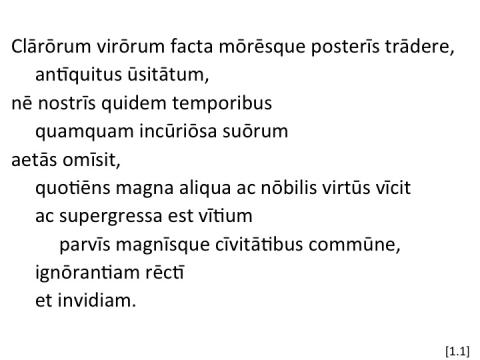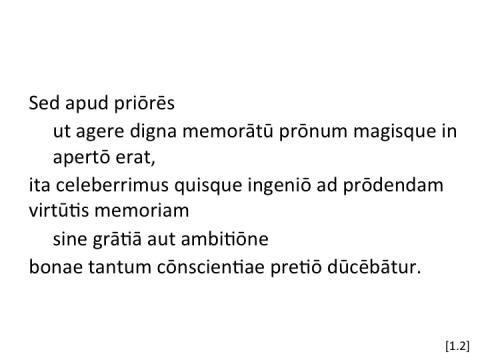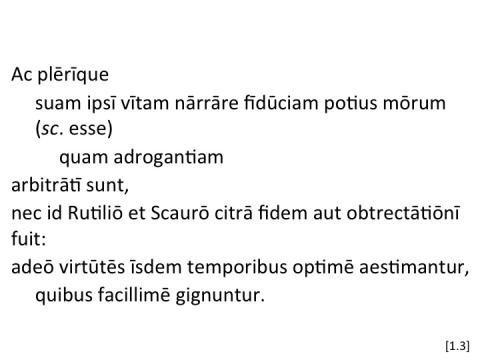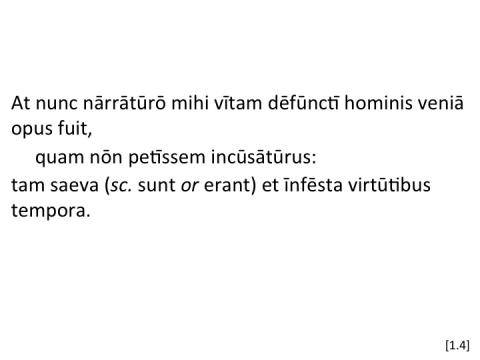[1.1] Clārōrum virōrum facta mōrēsque posterīs trādere, antīquitus ūsitātum, nē nostrīs quidem temporibus quamquam incūriōsa suōrum aetās omīsit, quotiēns magna aliqua ac nōbilis virtūs vīcit ac supergressa est vītium parvīs magnīsque cīvitātibus commūne, ignōrantiam rēctī et invidiam. [1.2] Sed apud priōrēs ut agere digna memorātū prōnum magisque in apertō erat, ita celeberrimus quisque ingeniō ad prōdendam virtūtis memoriam sine grātiā aut ambitiōne bonae tantum cōnscientiae pretiō dūcēbātur. [1.3] Ac plērīque suam ipsī vītam nārrāre fīdūciam potius mōrum quam adrogantiam arbitrātī sunt, nec id Rutiliō et Scaurō citrā fidem aut obtrectātiōnī fuit: adeō virtūtēs īsdem temporibus optimē aestimantur, quibus facillimē gignuntur. [1.4] At nunc nārrātūrō mihi vītam dēfūnctī hominis veniā opus fuit, quam nōn petīssem incūsātūrus: tam saeva et īnfēsta virtūtibus tempora.
notes
Overview: In former times lives of great men were often written. Even autobiographies were received with favor. Nowadays a biographer has to crave a hearing. (Stuart)
Clārōrum ... trādere: object of omīsit. Though the grammatical object, the infinitival phrase comes first, because it is the logical subject — the "text," as it were, of the whole chapter. (Pearce) [A&G 453]
antīquitus: in Republican times; apud priores below refers to the same period. In chapter 10.3 even Livy is classed with the veteres scriptores. (Stuart)
ūsitātum: “a custom.” The p.p.p. is here used in the neuter as a noun, in apposition to the preceding infinitival phrase. (Pearce) [A&G 496]
nostrīs ... temporibus ... aetās: a pleonastic expression for nostra aetās; but nostrīs temporibus makes a better contrast to antīquitus. (Pearce)
quamquam incūriōsa: this use of quamquam without a verb is unclassical (though quamvis = "however" is so used with adjectives). As an adjective often stands in an adversative relation to the verb, it is felt as equivalent to an adversative clause, and this relation is brought out more explicitly by the addition of the appropriate adversative conjunction quamquam. Compare to the English use of “if,” “while,” “although” with adjectives and participles. (Pearce) quamquam: with a participle, or more rarely with an adjective, occasionally occurs in earlier Latin. ... Tacitus has more than seventy instances. (Gudeman) incūriōsa: a Silver Latin word, is used by Tacitus with a genitive or a dative. The genitive depends on the idea of the noun cūra contained in the adjective. See note on securus odii in 43.3 (Pearce)
suōrum: this word may be taken either as masculine or as neuter. (Stuart); probably neuter (Pearce); neuter. (Gudeman)
aetās: concrete; as we often use “age” for the people living in the age. (Pearce); the personification, especially common with expressions denoting time, lessens the tautology occasioned by the use of temporibus. (Gudeman)
aliqua: belonging to both magna and nōbilis, is, according to a noteworthy usage of Tacitus, placed between the modified words. So magis below. See Introd. p. xxvi, #4. (Gudeman)
virtūs: not in the abstract; the reference is to some notable instance of merit in an individual. (Stuart) virtūs vīcit ... vītium: observe the alliteration, of which Tacitus makes a more extensive use than any previous prose writer. See Introd. p. xxviii, #13. (Gudeman) vīcit ac supergressa est: the second verb adds a vivid detail to the metaphor contained in the first. (Pearce) supergressa est: a post-Augustan expression, somewhat stronger than vīcit. (Gudeman)
ignōrantiam rēctī et invidiam: invidia is the effect, ignōrantiam rēctī the cause. (Stuart); "the inability to recognize true merit and consequent envy." The et is epexegetic. ... In this treatise again ch. 5.1, 6.1, 29.3, 30.3, 41.2. See Introd. p. xxx, #18. (Gudeman) invidiam: people look askance at what they do not understand. (Pearce)
1.2
priōrēs: i.e. in the days of the Republic. So generally in Tacitus. See note on vetus, 2.3. (Gudeman)
agere: “the performance of, etc.” The infinitive is here the nominative of the verbal noun, as tradere above was the accusative. (Pearce) [A&G 452-3]
digna memorātū: for the classical construction digna quae memorentur. (Pearce) [A&G 510]
prōnum: literally, "downhill." (Stuart); “easy,” from the idea that descent is easy, ascent difficult. (Pearce) in apertō: a favorite phrase of Tacitus both in the literal sense and in the derived sense, as here. Compare the English "a fair field." (Stuart) prōnum magisque in apertō: metaphors taken from a field which lies open and offers no obstacles to advancement, i.e. those times were favorable and gave free scope to memorable achievement. Similarly, ch. 33.4, and frequently in earlier writers. On the position of magis, see above, 1.1. On the accumulation of virtually synonymous expressions occurring with constantly decreasing frequency from the Dialogus to the second part of the Annals, see Introd. p. xxix, #15. On the brachylogy in this sentence, see Introd. p. xxxiii, #10. (Gudeman)
celeberrimus: in Tacitus, as well as in other writers of the Empire, celeber often equals clārus. ... Join ingeniō with celeberrimus in translation. (Stuart) celeberrimus quisque ingeniō = clarissima ingenia. (Gudeman)
ad prōdendam virtūtis memoriam: the primary object of the eulogistic biography. Chief among biographical writers of the Republic were M. Terentius Varro, 116-27 BCE, the most learned man of his time, who wrote Imagines or Portraits of famous men both Greek and Roman, and a friend of Cicero, Cornelius Nepos, a portion of whose book De Viris Illustribus has come down to us. (Stuart)
sine grātiā aut ambitiōne: “without predilection or thought of self-advancement.” (Stuart); “without showing or seeking favour.” (Pearce); i.e. without the desire of currying favor or from selfish motives. Our knowledge of the historians of the Republic, particularly the later annalists, does not bear out this favorable view. (Gudeman) grātiā: “partiality, partisan-feeling in favour of the subject of their history.” (Pearce) ambitiōne: “interested motives.” (Pearce)
bonae tantum cōnscientiae pretiō: the realization that they had performed a good deed was their sole reward. Tantum is an adverb. (Stuart); i.e. by the reward that waits on duty well performed. pretio = praemio. (Gudeman) bonae ... cōnscientiae: conscientia does not mean “conscience,” the seat of the moral sense in general; but “consciousness” of something in particular. With bona or mala it means the consciousness of having done well or ill, and corresponds pretty closely to our “good” or “bad conscience,” which is used in reference to particular actions. (Pearce)
1.3
ac: “and indeed.” (Pearce)
plērīque: here, as often in Tacitus, in the modified sense of “many.” See chapter 40.5, 42.4. (Stuart); “many.” This weakened sense is the more usual in Tacitus and in post-Augustan Latin generally. (Gudeman)
suam ipsī: equivalent in translation to suam ipsorum; the intensive pronoun is attracted into the nominative, as is frequently the case. For a similar usage chapter see 46.3, tuīs ipse mōribus possīs. (Stuart) ipsī should strictly be ipsōs as subject of the inf. nārrāre or ipsorum in agreement with the possessive notion of suam, but it is attracted to the case of the subject of the main verb arbitrātī sunt, as this is also logically the subject of the infinitival phrase. (Pearce); for suam ipsōs (= suam ipsorum). ... Observe that two ideas here coalesce into one. (a) They wrote autobiographies. (b) They did not think it open to censure to do so. On the conciseness of this clause, see Introd. p. xxxiii, #10. (Gudeman)
fiduciam potius morum: sc. esse, as the predicate of the indirect statement introduced by arbitrati sunt. (Damon); “(a token of) confidence in their character.” (Stuart)
Rutiliō et Scaurō: Publius Rutilius Rufus, consul in 105 BCE, was an adherent of the Stoic philosophy and a man of high character. He was driven into exile on a false charge of extortion and died in Smyrna. He wrote, besides his autobiography, a History of Rome in Greek, and numerous speeches. He is elsewhere, as here, mentioned in connection with his political rival, Marcus Aemilius Scaurus, consul in 115 BCE and again in 107. Scaurus played a prominent part in the dealings of the Senate with Jugurtha and incurred infamy and prosecution by accepting bribes from the Numidian king. The autobiography here mentioned is characterized by Cicero as a valuable work which no one read. (Stuart) Rutiliō: P. Rutilius Rufus (consul, 105 BCE) was condemned on a trumped-up charge of extortion by the "knights," at once his accusers and his judges, in revenge for his efforts as proconsul of Asia to check their rapacity. He became a stock example of nobly-borne adversity. (Pearce) Rutiliō et Scaurō: P. Rutilius Rufus, born about 158 BCE, cons. 105 BCE, a distinguished orator, jurist, historian, and pupil of the Stoic Panaetius. In 93 BCE he was accused by one Apicius of extortion. ... M. Aemilius Scaurus, his bitter opponent, was born 162 BCE, and died about 89 BCE. His autobiography, in three books, seems to have been an apōlogia prō vītā suā.
et: for aut, partly because these men are closely associated as contemporaries and autobiographers, partly owing to the aut following. It must be observed, however, that the Latin, as well as the Greek, has a peculiar fondness for the copulative conjunction, where our idiom prefers the disjunctive particle. (Gudeman)
citrā fidem: their works did not, as we might say, "fall short" of obtaining credence. Citra in this sense is practically equivalent to sine. See chapter 35.2, citrā Romanum sanguinem, "without shedding the blood of Romans." (Stuart); on the collocation of a prepositional clause, and an ablative or dative, one of the noteworthy features of Tacitean style, see Introd. p. xxxiv, #2. (Gudeman)
obtrectātiōnī: "predicative" dative ; it is used to show that for which a thing serves or which it brings about. Translate: "a matter of reproach." The number of words so used is comparatively small, and obtrectātiōnī seems to be so used first by Tacitus. (Pearce) [A&G 382]
adeō: at the beginning of a sentence adeō often introduces an illustration of a truth contained in a previous sentence. Translate: “so true is it that,” etc. (Stuart); the confirmation of a concrete statement by the wider generalization of an admitted truth is characteristic of Tacitus and Livy. (Gudeman)
1.4
at nunc: contrasting the difficulties under which the biographer labors nowadays with the happier conditions that prevailed apud priores. Tacitus has to ask for tolerance, although he is writing not an autobiography, but an account of the life of another man and one whom death should have carried beyond the reach of envy. (Stuart); i.e. “under the circumstances, as it is.” In this non-temporal sense the adverb, as νῦν in Greek, is very common. (Gudeman); opposed to the times when the writing of biographies and even autobiographies was an honoured custom. (Pearce)
nārrātūrō, etc.: to the ancients a narratio vitae implied a more or less eulogistic treatment, hence the phrase here constitutes the proper antithesis called for by incusaturus. (Gudeman)
vītam defūnctī hominis: and therefore less open to cavil than the writing of an autobiography or the biography of a man still alive. (Pearce)
opus fuit: for the idiom opus est see A&G 411. Critics differ on how to understand the tense of fuit. (Damon); “I have been compelled.” The perfect tense is used because the example of the past has already virtually been pleaded in excuse. (Pearce); similar to the epistolary perfect, the author putting himself into the place of the reader. (Gudeman) [A&G 479] fuit: Tacitus projects himself in thought to the time of his reader and forestalls possible loss of patience with his apologetic attitude by taking the reader into his confidence. (Stuart)
incūsātūrus ... tempora: incūsātūrus balances nārrātūrō; tempora balances vītam hominis. The antithesis may be stated as follows: Eulogy is my intent, the life of a worthy man my theme. I ask indulgence because "envy doth merit as its shade pursue" and because biographies are not favored now. It would be otherwise if my attitude were censorious — men lend ready ears to detraction — and if my subject were the hateful regime of Domitian, — a period, not a man. Then I would not need to ask for a hearing. (Stuart) nōn petīssem incūsātūrus: that is, because an avowed invective would have been more welcome. The future participle is used for a conditional clause, as often in poetry and post-Ciceronian prose. (Pearce) [A&G 499]
tam saeva ... : sc. sunt. This sentence seems to be explanatory of nunc. It does not, of course, refer to the government, with which Tacitus was satisfied (see 3.1), but to the temper of the reading public, whose malice could bear nothing but invective in a work dealing with a man who had accommodated himself to Domitian's rule. ... tam here = adeō. (Pearce); Pearce suggests supplying sunt, with reference to nunc, but Woodman makes a case for supplying erant instead, with reference to the more broadly conceived nostris ... temporibus in 1.1, which is roughly equivalent to "my lifetime." (Damon)
vocabulary
antīquitus: in ancient times
ūsitātus –a –um: usual, customary; (as a noun) custom
nē…quidem: = nequidem, not ... even
incūriōsus –a –um: heedless, indifferent (w. gen.)
omittō omittere omīsī omissus: to neglect, pass over
supergredior -gredī -gressus sum: to overcome
ignōrantia -ae f.: ignorance, want of appreciation
memorātus memorātūs m.: mention, mentioning
prōnus –a –um: easy
apertus aperta apertum: open, accessible; (as a noun) the open
celeber celebris celebre: celebrated, famous
ambitiō ambitiōnis f.: self-seeking, ambition, ostentation
tantum: only
cōnscientia cōnscientiae f.: consciousness, knowledge, conscience
fīdūcia fīdūciae f.: confidence
arrogantia –ae f.: arrogance, haughtiness
Rutilius –ī m.: Publius Rutilius Rufus, cos. 105 BCE
Scaurus –ī m.: M. Aemilius Scaurus, cos. 115, 107 BCE
citrā: short of, without
obtrectātiō obtrectātiōnis f.: censure, detraction
optimus –a –um: best
aestimō aestimāre aestimāvī aestimātus: value, test, judge.
dēfungor dēfungī dēfūnctus sum: to die
venia veniae f.: pardon
incūsō incūsāre incūsāvī incūsātus: to censure
īnfestus –a –um: hostile




